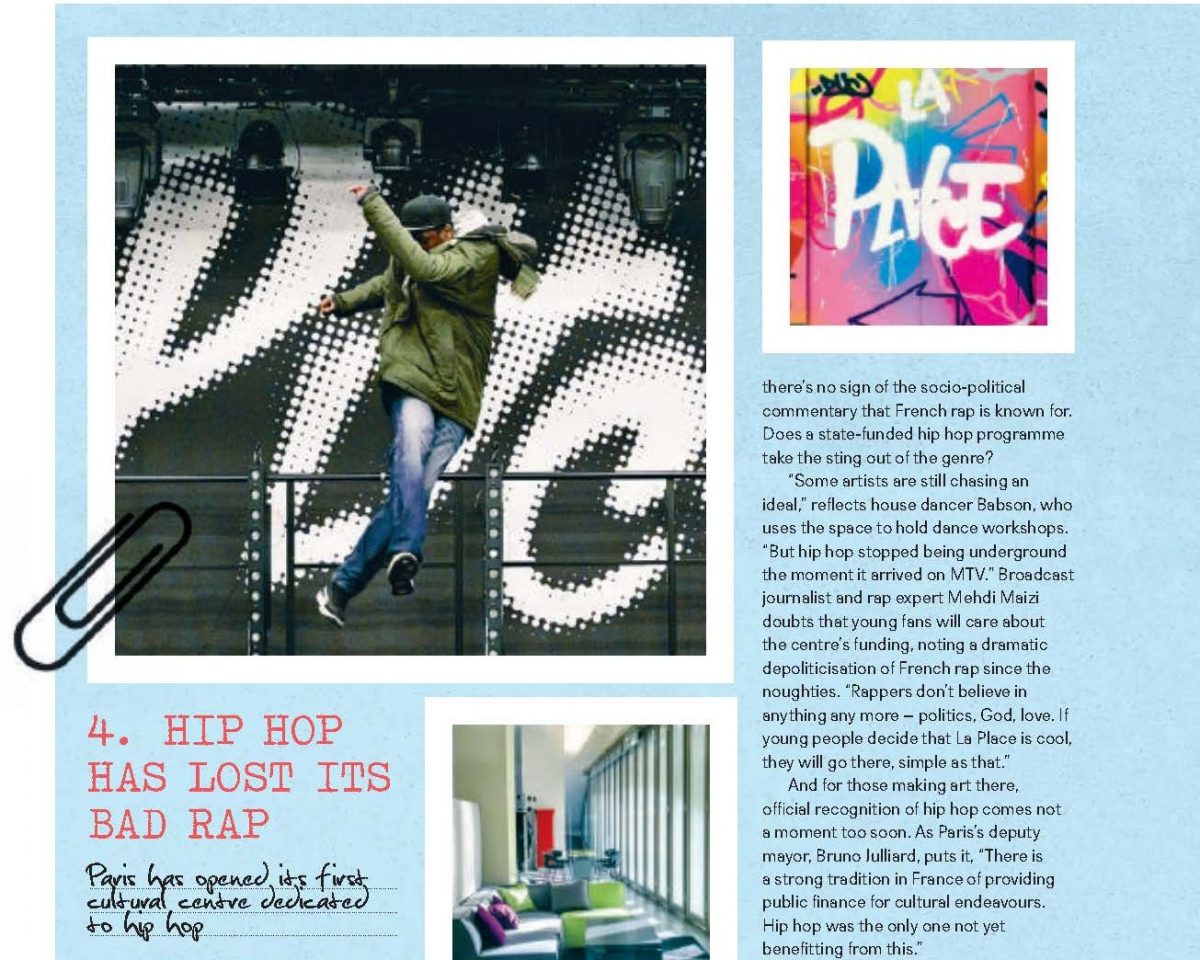From the outside, it’s just another polished window in a row of commercial façades: Sephora, Lacoste, KIKO. But behind two sliding glass doors, a dance off is in session. Rapper Sofiane’s throaty growl reverberates from a boombox as dancers in snapbacks pop and lock to a whooping crowd and a backdrop of neon-coloured, spray-painted walls. It’s a Wednesday afternoon at La Place Centre Culturel Hip Hop, France’s first cultural centre dedicated entirely to hip hop in all its forms, from rap to street dance, graffiti to fashion.
Opened last October in the controversial Les Halles shopping mall – currently emerging from an eight-year, €1 billion reconstruction – the space comprises a gig venue (Oddisee & Good Company kick off this month); an auditorium for conferences and documentary screenings; recording, DJ and dance studios; and a co-working space. What makes La Place ground-breaking is that it was conceived of and largely funded by the Paris mayor’s office, marking a seismic shift away from France’s previous government rhetoric – past politicians have publicly blamed rappers’ lyrics for social unrest, at times even in court.
It comes at a revolutionary moment for French rap, with the country’s hottest artists using streaming sites such as Deezer and Spotify to challenge the status quo. Rap duo PNL, from the south Paris suburb Corbeil-Essonnes, exploded onto the scene in 2015 as a YouTube sensation. They’ve never done an interview or signed to a label – yet they topped the iTunes album chart last November. “Only hip hop artists are this entrepreneurial,” claims director of La Place, hip hop guru Jean-Marc ‘JM’ Mougeot, whose past lives as break dancer, DJ, radio producer and festival organiser made him a clear choice for the job. “It means that we’ll always have an interesting angle at La Place, based on each artist’s unique way of doing things.”
Les Halles, too, is a fitting location for La Place. Sitting above Châtelet – the biggest underground station in the world, and the convergence of Paris’s suburban train lines – the site is infamous for spontaneous street dance and music. Nevertheless, the shiny new mall presents a decidedly cleaned-up version of a setting once known for its gritty urban activity. Between La Place’s spotless walls and sunlit, ballet-ready dance studios, none of the socio-political commentary that’s historically characterised hip hop in France is palpable there. You’ve got to wonder: does a state-funded hip hop initiative mark the sanitisation of a genre defined in opposition to the establishment?
“Some artists are chasing an ideal,” contemplates house dancer Babson, who uses the space and is holding dance workshops there this month. “But the fact is that hip hop stopped being underground the moment it arrived on MTV. As soon as you commercialise something, it’s no longer underground.”
For the artists and employees working at La Place, official recognition of hip hop as an influential cultural movement comes not a moment too soon. As Paris’s deputy mayor Bruno Julliard puts it, “there is a strong tradition in France of public finance for cultural endeavours. Hip hop was the only one not yet benefitting from funding.” It’s worth noting, however, that receiving funding from the mayor’s office is still a far cry from winning a Ministry of Culture grant, awarded to more conservative institutions such as the Opéra-Comique and the Philharmonie concert hall.
In any case, for Babson, focusing on the funding misses the point. “Working with an institution is not the same as working for an institution,” he asserts. “And to evolve, you have to understand the structures in place.” OLKM broadcast journalist and rap expert Mehdi Maizi doubts that many young people will even question the centre’s funding, noting that French hip hop has become dramatically depoliticised since the noughties. “Rappers don’t believe in anything anymore – politics, God, love. If young people decide that La Place is cool, they will go there, simple as that.”
Which leaves us with the major challenge facing La Place: how will it appeal to the youngest generation of hip hop fans? In the directors’ efforts to appeal to a cross-generational audience, the programme is in danger of being a bit too old-school. One of its first concerts was by 90s MC KRS-One, who at 51 is ideal nostalgia-trip material – but doesn’t necessarily speak to the banlieue-based teens who listen to PNL, and who the centre ultimately hopes to reach.
“Maybe in 20 years’ time, rap will be like jazz, and old people will listen to it with a brandy while smoking a cigar. But right now, young people make the law,” says Maizi. “If La Place is disconnected from them, then it’s not speaking to the people who listen to hip hop every day. It has to be relevant. Rap can never be boring.” laplace.paris
